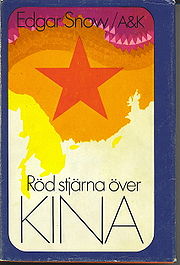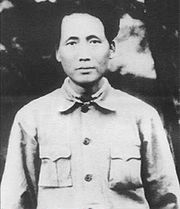
Red Star Over China
Encyclopedia


Edgar Snow
Edgar P. Snow was an American journalist known for his books and articles on Communism in China and the Chinese Communist revolution...
, is an account of the Communist Party of China
Communist Party of China
The Communist Party of China , also known as the Chinese Communist Party , is the founding and ruling political party of the People's Republic of China...
written when they were a guerrilla
Guerrilla warfare
Guerrilla warfare is a form of irregular warfare and refers to conflicts in which a small group of combatants including, but not limited to, armed civilians use military tactics, such as ambushes, sabotage, raids, the element of surprise, and extraordinary mobility to harass a larger and...
army still obscure to Westerners. Along with Pearl Buck's The Good Earth
The Good Earth
The Good Earth is a novel by Pearl S. Buck published in 1931 and awarded the Pulitzer Prize for the Novel in 1932. The best selling novel in the United States in both 1931 and 1932, it was an influential factor in Buck winning the Nobel Prize for Literature in 1938...
, it was the most influential book on Western understanding and sympathy for China in the 1930s.
Overview
In Red Star Over China, Edgar SnowEdgar Snow
Edgar P. Snow was an American journalist known for his books and articles on Communism in China and the Chinese Communist revolution...
recounts the months that he spent with the Chinese
China
Chinese civilization may refer to:* China for more general discussion of the country.* Chinese culture* Greater China, the transnational community of ethnic Chinese.* History of China* Sinosphere, the area historically affected by Chinese culture...
Red Army in the summer and fall of 1936. Snow uses his extensive interviews with Mao and the other top leaders to present vivid descriptions of the Long March
Long March
The Long March was a massive military retreat undertaken by the Red Army of the Communist Party of China, the forerunner of the People's Liberation Army, to evade the pursuit of the Kuomintang army. There was not one Long March, but a series of marches, as various Communist armies in the south...
, as well as biographical accounts of leaders on both sides of the conflicts, including Zhou Enlai
Zhou Enlai
Zhou Enlai was the first Premier of the People's Republic of China, serving from October 1949 until his death in January 1976...
, Peng Dehuai
Peng Dehuai
Peng Dehuai was a prominent military leader of the Communist Party of China, and China's Defence Minister from 1954 to 1959. Peng was an important commander during the Second Sino-Japanese War, the Chinese civil war and was also the commander-in-chief of People's Volunteer Army in the Korean War...
, Lin Biao
Lin Biao
Lin Biao was a major Chinese Communist military leader who was pivotal in the communist victory in the Chinese Civil War, especially in Northeastern China...
, He Long
He Long
He Long was a Chinese military leader. He rose to the rank of Marshal and Vice Premier after the founding of the People's Republic of China.-Early life:He Long was a member of the Tujia ethnic group...
, and Mao Zedong
Mao Zedong
Mao Zedong, also transliterated as Mao Tse-tung , and commonly referred to as Chairman Mao , was a Chinese Communist revolutionary, guerrilla warfare strategist, Marxist political philosopher, and leader of the Chinese Revolution...
's own account of his life.
When Snow wrote, there were no reliable reports reaching the West of what was going on in the communist-controlled areas. Snow's status as an international journalist not previously identified with the communist movement gave his reports the stamp of authenticity. The glowing pictures of life in the communist areas contrasted with the gloom and corruption of the Kuomintang
Kuomintang
The Kuomintang of China , sometimes romanized as Guomindang via the Pinyin transcription system or GMD for short, and translated as the Chinese Nationalist Party is a founding and ruling political party of the Republic of China . Its guiding ideology is the Three Principles of the People, espoused...
government. Many Chinese learned about Mao and the communist movement from the almost immediate translations of Mao's autobiography, and readers in North America and Europe, especially those with liberal views, were heartened to learn of a movement which they interpreted as being anti-fascist and progressive. Snow reported clearly Mao's new United Front policy which left violent class struggle
Class struggle
Class struggle is the active expression of a class conflict looked at from any kind of socialist perspective. Karl Marx and Friedrich Engels wrote "The [written] history of all hitherto existing society is the history of class struggle"....
behind.
Although Snow made clear that Mao's ultimate aim was control of China, many readers got the impression that the Chinese communists were "agrarian reformers."
Snow's Preface to the revised edition of 1968 describes the book's original context:
The Western powers, in self-interest, were hoping for a miracle in China. They dreamed of a new birth of nationalism that would keep Japan so bogged down that she would never be able to turn upon the Western colonies—her true objective. Red Star Over China tended to show that the Chinese Communists could indeed provide that nationalist leadership needed for effective anti-Japanese resistance. How dramatically the United States' policy-making attitudes have altered since then […]
It provided not only for non-Chinese readers, but also for the entire Chinese people—including all but the Communist leaders themselves—the first authentic account of the Chinese Communist Party and the first connected story of their long struggle to carry through the most thoroughgoing social revolution in China's three millenniums of history. Many editions were published in China …
Publishing history
Snow was not available to read proofs of the initial London and New York editions, but he revised the text of the 1939 and 1944 editions. The Publisher's Note of the 1939 edition explains that Snow added a "substantial new section" of six chapters bringing the narrative up to July 1938 as well as "many textual changes." Snow made the textual changes partly to polish but he also responded to friends and reviewers. Some of them felt Snow's account of party history had been too critical of Soviet policy, and others felt that he had given too much credit to Mao for independent Chinese strategies. Snow toned down but did not remove the implicit criticisms of Stalin. The 1944 edition was allowed to go out of print in the 1950s, but Snow made substantial revisions and annotations for the Grove Press reprint of 1968.Edgar Snow, Red Star over China London: Left Book Club
Left Book Club
The Left Book Club, founded in 1936, was a key left-wing institution of the late 1930s and 1940s in the United Kingdom set up by Stafford Cripps, Victor Gollancz and John Strachey to revitalise and educate the British Left. The Club's aim was to "help in the struggle For world peace and against...
, Victor Gollancz
Victor Gollancz
Sir Victor Gollancz was a British publisher, socialist, and humanitarian.-Early life:Born in Maida Vale, London, he was the son of a wholesale jeweller and nephew of Rabbi Professor Sir Hermann Gollancz and Professor Sir Israel Gollancz; after being educated at St Paul's School, London and taking...
, 1937; this edition reprinted as Red Star Over China - The Rise Of The Red Army. (2006; ISBN 1-4067-9821-5).
--, (New York: Random House, 1938). Some changes from the London edition.
--, (Garden City, 1939) "Revised," with six extra chapters.
--, (New York: Modern Library, 1944).
--, (New York: Grove, 1968) Extensive revisions, with notes and annotations added.
Assessments and criticisms
The book has been called the "scoop of the century" and it clearly played a role in swaying Western and Chinese opinion in favor of Mao. Indeed, Mao commented that the book "had merit no less than Great Yu controlling the floods." According to Jung ChangJung Chang
Jung Chang is a Chinese-born British writer now living in London, best known for her family autobiography Wild Swans, selling over 10 million copies worldwide but banned in the People's Republic of China....
and Jon Halliday
Jon Halliday
Jon Halliday is a historian of Russia and was a former Senior Visiting Research Fellow at King's College London.Halliday authored a biography of filmmaker Douglas Sirk and has written and edited seven other books. He and his wife, Jung Chang, live in Notting Hill, West London...
in their book Mao: The Unknown Story
Mao: The Unknown Story
Mao: The Unknown Story is a 2005 biography of Chinese Communist leader Mao Zedong written by the husband and wife team of writer Jung Chang and historian Jon Halliday, and depicts Mao as being responsible for more deaths in peacetime than Adolf Hitler or Joseph Stalin.In conducting their research...
, Snow probably believed what he was told to be true, and much of it is still of basic significance, especially the so-called "Autobiography of Mao." But Mao omitted key elements from his accounts of party history and Snow missed others. Recent scholarship also demonstrates that Snow submitted the transcripts of his interviews to be edited and approved by Party officials and critics charge that changes in the American edition were made in response to the Communist Party of the United States. The account of the Long March
Long March
The Long March was a massive military retreat undertaken by the Red Army of the Communist Party of China, the forerunner of the People's Liberation Army, to evade the pursuit of the Kuomintang army. There was not one Long March, but a series of marches, as various Communist armies in the south...
has come under particular criticism, only to have others reassert its basic validity.
External links
- Snow's 4-chapter biography of Mao can be found here http://www.humanrights-china.org/meetingchina/Meeti2002114155129.htm and here http://www.etext.org/Politics/MIM/faq/bionotes.html.
- Behind Red Star over China (2006 account from China DailyChina DailyThe China Daily is an English language daily newspaper published in the People's Republic of China.- Overview :China Daily was established in June 1981 and has the widest print circulation of any English-language newspaper in the country...
) - There has also been a Chinese screen adaptation http://english.people.com.cn/english/200010/10/eng20001010_52224.html, which was however rejected by Edgar Snow's widow http://www.hartford-hwp.com/archives/55/418.html.
- Georgi Dimitrov and the Chinese Revolution

